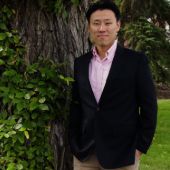
Shintaro Kono, PhD
Pronouns: He/him
Contact
Associate Professor, Faculty of Kinesiology, Sport, and Recreation - Academic Programs
- skono@ualberta.ca
Overview
Area of Study / Keywords
Leisure Well-Being Culture Mixed Methods Online Intervention
About
I am a Japanese who enjoys playing an MMORPG, playing badminton and golf, and watching sitcoms!
Degrees:
Ph.D., Faculty of Kinesiology, Sport, and Recreation, University of Alberta, Canada, 2017
M.S., Department of Recreation, Sport, and Tourism, University of Illinois at Urbana-Champaign, U.S.A, 2012
B.A., Department of Sports and Leisure Management, Tokai University, Japan, 2011
Research
Dr. Kono's research revolves around the relationship between leisure engagement and subjective well-being. Specifically, he is interested in answering: How does leisure engagement increase participants' subjective well-being and why? He also examines this issue from a cross-cultural and non-Western perspective, by bringing in non-Western/English concepts such as ikigai (life worth living in Japanese). In addition, Dr. Kono has studied predictors of quality leisure engagement such as leisure constraints and constraint negotiation. He also utilizes a wide range of both qualitative (e.g., grounded theory, photo-elicitation) and quantitative (e.g., experiments, structural equation modeling) methods to address the said topics.
Teaching
RLS 100, Life Leisure and the Pursuit of Happiness
RLS 223, Leisure and Human Behavior
KSR 500, Concepts and Theories in Leisure and Recreation
Announcements
Currently, Dr. Kono is interested in mobilizing the knowledge on leisure and well-being to implement online leisure education in accessible media (e.g., YouTube videos) to improve subjective well-being on a large scale.
Research Students
Currently accepting undergraduate students for research project supervision.